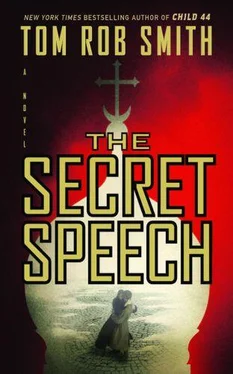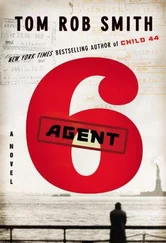Tom Smith - The Secret Speech
Здесь есть возможность читать онлайн «Tom Smith - The Secret Speech» весь текст электронной книги совершенно бесплатно (целиком полную версию без сокращений). В некоторых случаях можно слушать аудио, скачать через торрент в формате fb2 и присутствует краткое содержание. Жанр: Триллер, на английском языке. Описание произведения, (предисловие) а так же отзывы посетителей доступны на портале библиотеки ЛибКат.
- Название:The Secret Speech
- Автор:
- Жанр:
- Год:неизвестен
- ISBN:нет данных
- Рейтинг книги:5 / 5. Голосов: 1
-
Избранное:Добавить в избранное
- Отзывы:
-
Ваша оценка:
- 100
- 1
- 2
- 3
- 4
- 5
The Secret Speech: краткое содержание, описание и аннотация
Предлагаем к чтению аннотацию, описание, краткое содержание или предисловие (зависит от того, что написал сам автор книги «The Secret Speech»). Если вы не нашли необходимую информацию о книге — напишите в комментариях, мы постараемся отыскать её.
The Secret Speech — читать онлайн бесплатно полную книгу (весь текст) целиком
Ниже представлен текст книги, разбитый по страницам. Система сохранения места последней прочитанной страницы, позволяет с удобством читать онлайн бесплатно книгу «The Secret Speech», без необходимости каждый раз заново искать на чём Вы остановились. Поставьте закладку, и сможете в любой момент перейти на страницу, на которой закончили чтение.
Интервал:
Закладка:
Puzzled by this elaborate anomaly, Leo stood up. Timur Nesterov entered the room, glancing at the book:
— Something important?
— I’m not sure.
Timur was Leo’s closest colleague and friend. The friendship they’d developed was of an understated kind. They didn’t drink together, banter, or talk very much except about work — a partnership typified by long silences. To cynics there was reason to suppose resentment in their relationship. Almost ten years younger, Leo was now Timur’s superior, despite the fact that he’d previously been his subordinate, always formally addressing him as General Nesterov. Objectively Leo had benefited more from their joint success. People had insinuated that he was a profiteer, individualistic and career-minded. But Timur showed no jealousy. The issue of rank was incidental. He was proud of his job. His family was provided for. In moving to Moscow he’d finally, after languishing on waiting lists, been appointed a modern apartment with running hot water and a twenty-four-hour electricity supply. No matter how their relationship might outwardly seem, they trusted each other with their lives.
Timur gestured toward the main factory floor where the towering Linotype machines stood, giant mechanical insects:
— The sons have arrived.
— Bring them in.
— With their father’s body in the room?
— Yes.
The sons had been allowed to leave, sent home by the militia before Leo could question them. He would apologize that they had to see their father’s body again but he had no intention of trusting secondhand information passed to him by the militia.
Summoned, Vsevolod and Akvsenti — both in their early twenties— appeared at the door, side by side. Leo introduced himself:
— I’m Officer Leo Demidov. I understand this must be difficult.
Neither of them looked at their father’s body, keeping their eyes on Leo. The older son, Vsevolod, spoke:
— We answered the militia’s questions.
— My questions won’t take long. Is this room as you found it this morning?
— Yes, it’s the same.
Vsevolod was doing all the talking. Akvsenti remained silent, his eyes occasionally flicking up. Leo continued:
— Was this chair at the table? It might have been knocked over, in the struggle perhaps?
— The struggle?
— Between your father and the killer?
There was silence. Leo continued:
— The chair’s broken. If you sat on it, it would collapse. It’s odd to have a broken chair in front of a desk. You can’t sit on it.
Both sons turned toward the chair. Vsevolod replied:
— You’ve brought us back to talk about a chair?
— The chair is important. I believe your father used it to hang himself.
The suggestion should have been ludicrous. They should have been outraged. Yet they remained silent. Sensing his speculation was on target, Leo pressed his theory:
— I believe your father hanged himself, maybe from one of the overhead beams in the factory. He stood on the chair and then kicked it from under his feet. You found his body this morning. You dragged him here, replaced the chair, not noticing that it had been damaged. One of you, or both of you, cut his throat in an attempt to conceal the scarring from the rope burns. The office was staged as if there was a break-in.
They were promising students. The suicide of their father might end their careers and destroy their prospects. Suicide, attempted suicide, depression — even vocalizing the desire to end your life — all these things were interpreted as slanders against the State. Suicide, like murder, had no place in the evolution of a higher society.
The sons were evidently deciding whether or not it was possible to deny the allegation. Leo softened his tone:
— An autopsy will reveal that his spine is broken. I have to investigate his suicide as rigorously as I would his murder. The reason for his suicide concerns me, not your understandable desire to cover it up.
The younger son, Akvsenti, answered, speaking for the first time:
— I cut his throat.
The young man continued:
— I was lowering his body. I realized what he’d done to our lives.
— Do you have any idea why he killed himself?
— He was drinking. He was depressed about work.
They were telling the truth yet it was incomplete, either through ignorance or calculation. Leo pressed the matter:
— A fifty-five-year-old man doesn’t kill himself because his readers got ink on their fingers. Your father has survived far worse troubles than that.
The older son became angry:
— I’ve spent four years training to be a doctor. All for nothing — no hospital will hire me now.
Leo guided them out of the office, onto the factory floor, away from the sight of their father’s body:
— You didn’t become alarmed that your father hadn’t come home until the morning. You expected him to be working late or you would’ve become concerned last night. If that is the case, why are there no pages of type ready to print?There are four Linotype printing machines. No pages have been set. There’s nothing to indicate any work was being done here.
They approached the enormous machines. At the front there was a typewriter-like device, a panel of letters. Leo addressed the sons:
— Right now you’re in need of friends. I can’t dismiss your father’s suicide. I can petition my superiors to stop his actions from impacting on your careers. Times are different now: the mistakes of your father need not reflect on you. But you must earn my help. Tell me what happened. What was your father working on?
The younger son shrugged:
— He was working on some kind of State document. We didn’t read it. We destroyed all the pages he’d set. He hadn’t finished. We thought maybe he was depressed because he was going to print another badly produced journal. We burned the paper copy. We melted the typeset pages down. There’s nothing left. That’s the truth.
Refusing to give up, Leo pointed at the machine:
— Which machine was he working on?
— This one.
— Show me how it works.
— But we’ve destroyed everything.
— Please.
Akvsenti glanced at his brother, evidently seeking permission. His brother nodded:
— You operate the machine by typing. At the back the device collects the letter molds. Each line is formed of individual molds grouped together with space molds in between. When the line is finished it’s cast from a mixture of molten lead and tin. It forms a slug. Those slugs are placed on this tray, until you have an entire page of text. The steel page is then covered in ink and the paper is rolled over — the text is printed. But, like we said, we melted all the pages down. There’s nothing left.
Leo walked around the machine. His eyes followed the mechanical process, the collection of letter molds to the assembly line. He asked:
— When I type, the letter molds are collected in this assembly grid?
— Yes.
— There are no complete lines of text. You destroyed those. But in the assembly grid, there’s a partial line, a line that hasn’t been finished.
Leo was pointing at an incomplete row of letter molds:
— Your father was halfway through a line.
The sons peered into the machine. Leo was right.
— I want to print these words.
The eldest son began tapping the space bar, remarking:
— If we add spaces to the end of the line, it will be of complete length and ready to cast as a slug.
Читать дальшеИнтервал:
Закладка:
Похожие книги на «The Secret Speech»
Представляем Вашему вниманию похожие книги на «The Secret Speech» списком для выбора. Мы отобрали схожую по названию и смыслу литературу в надежде предоставить читателям больше вариантов отыскать новые, интересные, ещё непрочитанные произведения.
Обсуждение, отзывы о книге «The Secret Speech» и просто собственные мнения читателей. Оставьте ваши комментарии, напишите, что Вы думаете о произведении, его смысле или главных героях. Укажите что конкретно понравилось, а что нет, и почему Вы так считаете.












